6/11/2024 – Second paper published!
Our second ISSI team paper has been published! We are very proud to present a comprehensive overview of the seismic wave detectabilities on Venus for a wide range of methods and instruments. You can read all about it in Garcia et al. (2024): “Seismic wave detectability on Venus using ground deformation sensors, infrasound sensors on balloons and airglow imagers” in Earth and Space Science.
Don’t want to go to the Wiley website? Download the pdf here.
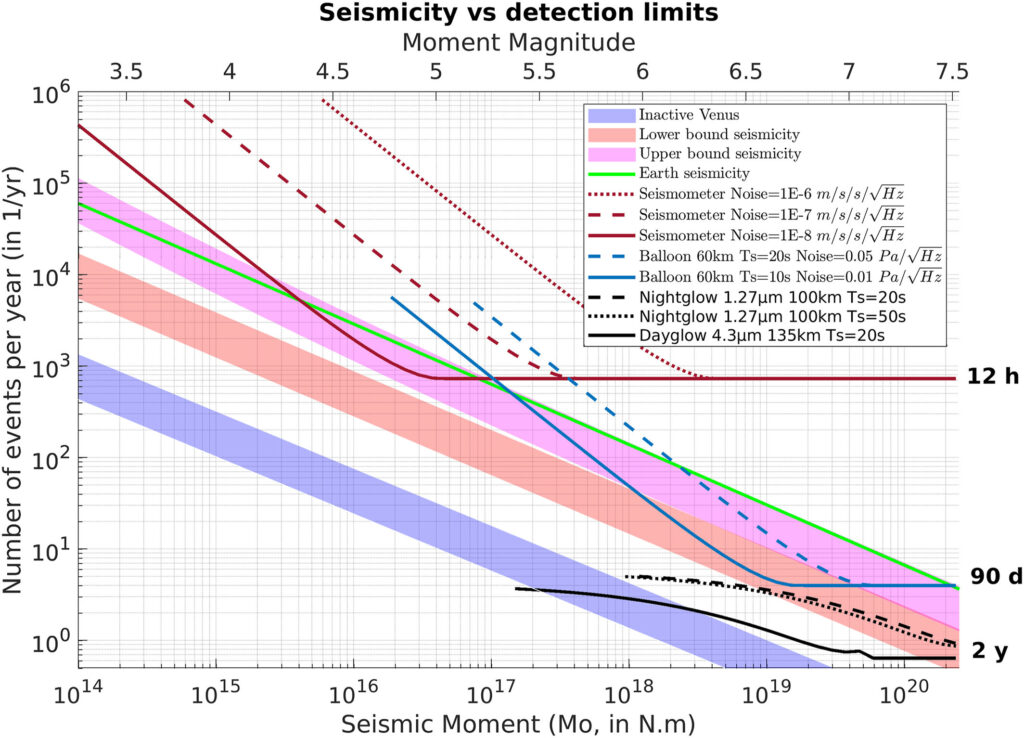
16/9/2024 – EPSC 2024
Many ISSI team members attended the Europlanet Science Congress in Berlin, Germany, and presented our ISSI team results there, so we simply had to go for dinner and take a picture to commemorate the occasion!
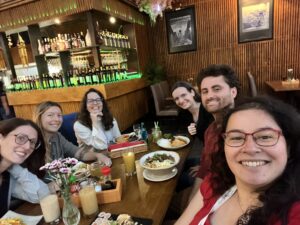
26/7/2024 – First paper published!
Our first ISSI team paper has been published! You can now read all about the latest estimates on Venusian seismicity in Van Zelst et al. (2024): “Estimates on the possible annual seismicity of Venus” in JGR: Planets.
Don’t want to go to the Wiley website? Download the pdf here.
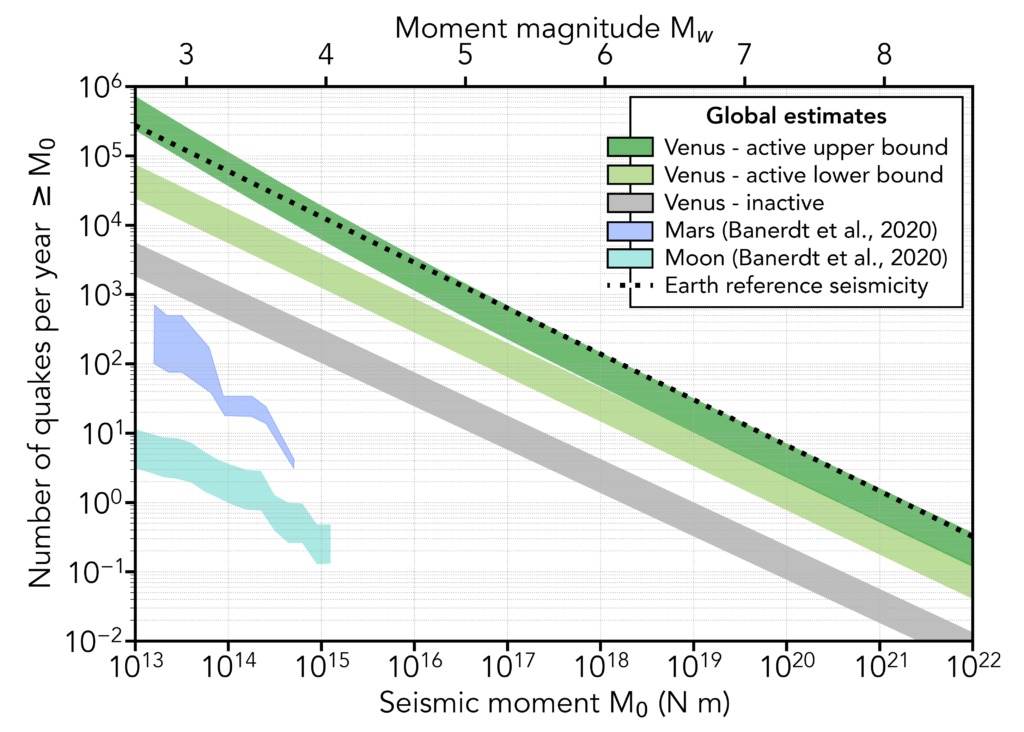
5/2/2024 – Second ISSI team meeting in Bern!
We had our second (and last, aww…) ISSI team meeting in Bern, Switzerland from 29 January – 2 February. We had a big team on site (12 people!) and there was also some online participation! We had a great time discussing Venus seismology and made a lot of progress on various projects.
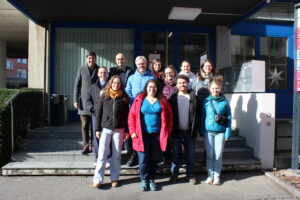
We even had time to shoot a couple of episodes of Science Sisters with some team members and ISSI people and we shot a sneaky little interview about the team itself. Of course there was also the opportunity to play QUARTETnary – the card game about the geological time scale in the breaks. One of the highlights (for the quiz masters at least) was ‘The Great British Venus Quiz’ hosted on Thursday night.

Between all the fun, we managed to start 4 different projects with manuscript outlines, preliminary figures, and quite some preliminary text completed by the end of the meeting. Now we just need to finish them. No big deal, right? Let’s go!
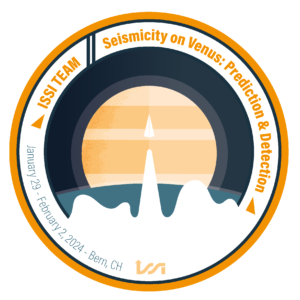
17/10/2023 – Public lectures on ‘Venus: cloudy with a chance of earthquakes’
Dr. Iris van Zelst (PI of the ISSI team ‘Seismicity on Venus: Prediction & Detection’) gave two public lectures at the Royal Astronomical Society (RAS) in London, UK about ‘Venus: cloudy with a chance of earthquakes’. In one hour, she introduced the audience to the mysteries of Venus and how scientists are trying to unravel them through models and the upcoming missions. Afterwards, there was a question session and a visit to the library of the RAS, where a special Venus exhibition was displayed, which Dr. Iris van Zelst helped curate. The lectures were well received and there were even some children in the audience who were very engaged and asked interesting questions about Venus. See the Outreach page for more information.
12/9/2023 – Launch Science Sisters Season 2
Science Sisters is a series of laughter-filled, candid interviews on career paths and academic life in the Earth and planetary sciences hosted by Dr. Iris van Zelst (PI of the ISSI team ‘Seismicity on Venus: Prediction & Detection’). Focussing on diversity, inclusion, and equality, as well as outreach, science communication, and the mental health of scientists, Science Sisters showcases different role models and tries to offer solutions to or – at the very least – ask important questions about science and academia that many academics struggle with. Of course, it also touches upon planetary science and specifically Venus as Venus is, after all, Earth’s sister planet.
Created, produced, and hosted by Dr. Iris van Zelst, several of the episodes have featured members of the ISSI team with Richard Ghail featuring in Season 1 and Ana-Catalina Plesa featuring in Season 2, spanning topics such as leadership and building a research group. See the Outreach page for more information.
12/5/2023 – EnVision meeting
We presented two talks on Venus seismology at the EnVision meeting in Berlin, Germany. It was a great meeting overall. Who knew so many people are doing exciting Venus science?!
16/3/2023 – Meeting up at LPSC
Quite a few of us attended the Lunar and Planetary Science Conference (LPSC) in the USA and so we met up for a drink to discuss all things Venus seismology!
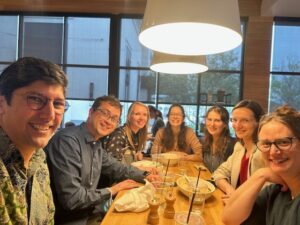
30/1/2023 – First ISSI team meeting in Bern!
We had our first in-person ISSI team meeting last week! Almost the entire team was able to make it (with some remote participation), and most of the team was able to come to Bern, Switzerland in person. Apart from seeing each other in 3D for the first time, we finally crunched some numbers and were able to make preliminary estimates of the expected seismicity on Venus. In particular, we quantified the frequency of quakes with a magnitude of 6 or higher, which are within the (pessimistic) detection limits of existing detection methods. We also quantified the minimum amount of quakes of different magnitudes that can be detected with the current methods.
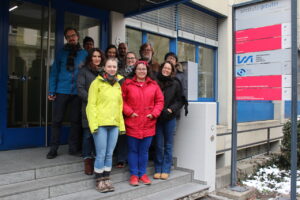
We further benefited from many interdisciplinary discussions and made progress on the estimation of the seismogenic zone depth and volume of Venus from different types of models and elastic thickness estimates. We also looked into the expected seismic noise on Venus to determine what amplitude signals we could still reasonably detect.
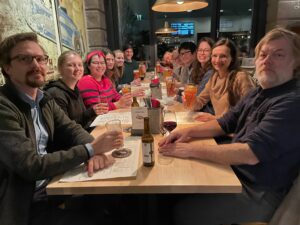
Practically speaking, we drafted an outline for a team paper and distributed tasks among the team members, with many paragraphs already written by this highly dedicated team. We also made significant progress on papers where subgroups of the team are involved. In general, this meeting was a great opportunity for all our team members to learn more about Venus, seismicity, and of course seismicity on Venus. We are excited to continue and refine our work on Venus seismicity now that a strong foundation for our various collaborations has been built!
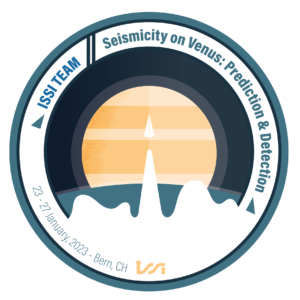
09/8/2022 – ISSI team kick-off meeting
We had our first (zoom) team meeting on August 9, 2022, so the ISSI team has now officially started! We played bingo and found out which team members have a twin and multiple nationalities, own a telescope, or dislike cheese fondue (important information for when we go to Bern, Switzerland for our in-person meeting). Richard Ghail also gave an overview of all the mysteries Venus still holds to set us off on our Venusian seismology journey.
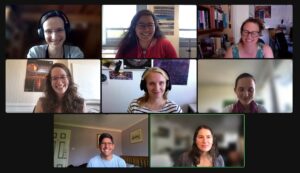
18/7/2022 – Save the date!
The first in-person ISSI team meeting will take place in Bern, Switzerland from January 23 – 27, 2023. During this meeting, we will review, discuss, and mainly actively work on projects to estimate the current level of seismicity on Venus. We also selected a day & time for the virtual monthly meetings: Tuesdays at 17:00h. The schedule of the monthly meetings with the exact dates can be found here.
24/5/2022 – ISSI Team funded!
Our ISSI Team “Seismicity on Venus: Prediction & Detection” led by Iris van Zelst was selected for funding by ISSI. The team consists of international experts on (planetary) seismology, geodynamics, and geology, including Andreas Fichtner, Raphaël F. Garcia, Richard Ghail, Anna Horleston, Taichi Kawamura, Philippe Lognonné, Julia Maia, Csilla Orgel, Mark Panning, Ana-Catalina Plesa, and Leah Sabbeth. The team will soon start working on investigating the seismicity of Venus through modelling and observations from its geological record, and propose hypotheses for testing their predictions by future missions. Stay tuned for exciting results to come!
Banner image by Lucía Perez-Diaz: www.luciaperezdiaz.com

